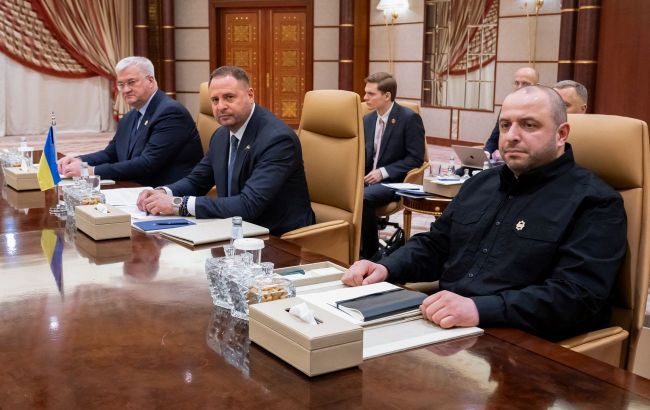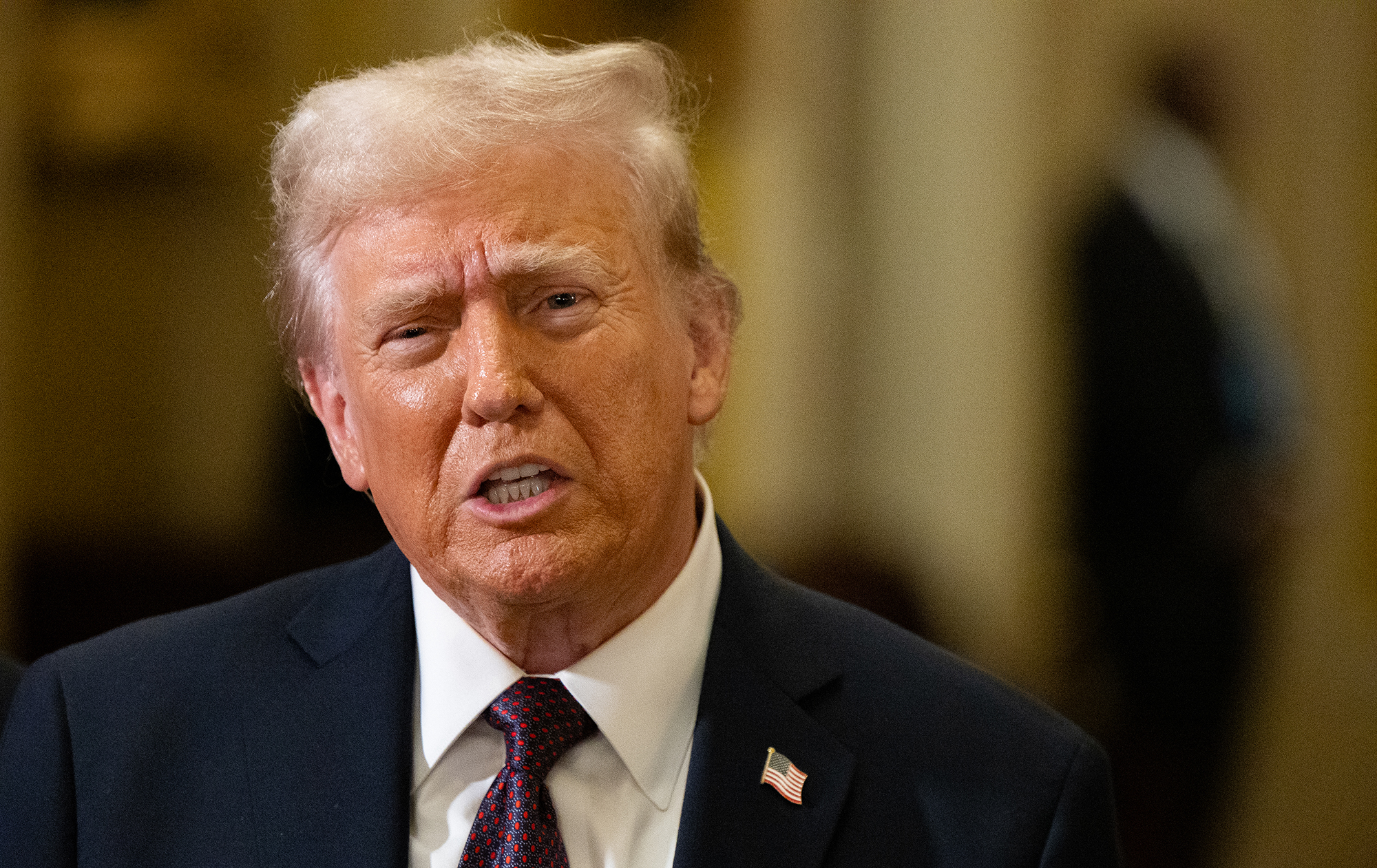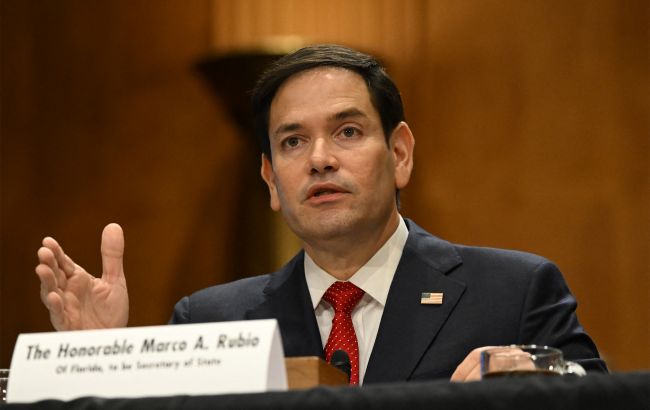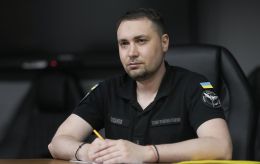London talks collapse: What happens and why US Secretary of State skips Ukraine meeting
 Photo: Members of the Ukrainian delegation at the negotiations (Getty Images)
Photo: Members of the Ukrainian delegation at the negotiations (Getty Images)
The ceasefire and overall war settlement talks that were to be held today in London at the level of foreign ministers were unexpectedly postponed. The level of delegations was downgraded amid media reports about Washington's peace plan, which involves recognizing Crimea as Russian and freezing the front line.
Takeaways:
- Why the high-level meeting in London failed and what discussions will take place today?
- What is the American peace plan, which the US remains silent about officially, but the Western press is writing about?
- Why did Rubio cancel his visit to London and what does Zelenskyy's statement about Crimea have to do with it?
- What is outraging European officials amid discussions about what a peace deal with Ukraine should look like?
Today's meeting in London was supposed to be the second after the negotiations in Paris, involving the United Kingdom, France, Germany, Ukraine, and the United States at the foreign minister level. It was expected that they would continue discussing the American plan to end the Russia-Ukraine war and the path to a ceasefire.
At the same time, President Volodymyr Zelenskyy noted that negotiations should primarily aim at achieving an unconditional ceasefire in Ukraine. Western media also wrote that Kyiv is focused on discussing a 30-day ceasefire rather than the framework of Trump's peace plan.
The Wall Street Journal reported that the Americans had presented their peace proposals in a confidential document handed to the Ukrainian delegation, and in London, they hoped to hear Kyiv's response to their initiatives. If the response was positive, these ideas would be forwarded to Moscow.
However, everything went "off script." The talks that were to take place today in London at the level of foreign ministers were unexpectedly postponed. All because of the US peace plan, which involves recognizing Crimea as Russian and freezing the front line.
What do US propose in their peace plan?
So what are the US proposing? The UK newspaper The Telegraph and the American outlet Axios revealed the content of the US proposals for ending the Russia-Ukraine war.
The key point of the proposal is the official recognition of occupied Crimea as Russian, as well as de facto recognition of the occupation of other territories. This would mean a "freezing" of the current frontline, leaving Russian dictator Vladimir Putin in control of most of the occupied lands.
At the same time, there are some changes in the plan in favor of Ukraine. Namely, Russia would relinquish two small territories currently occupied by its troops. As The Telegraph writes, a partial concession to Ukraine would be the restoration of access to the mouth of the Dnipro River and the withdrawal of Russian troops from another area of the Kherson region.
According to Axios, the US proposals to the Russian side include:
- "De jure" US recognition of Russian control over Crimea.
- "De facto" recognition of Russia's occupation of almost all of Luhansk region and occupied parts of the Donetsk, Kherson, and Zaporizhzhia regions.
- A promise that Ukraine will not become a NATO member. The text mentions that Ukraine may become part of the European Union.
- Lifting of sanctions imposed since 2014.
- Expansion of economic cooperation with the US, particularly in the energy and industrial sectors.
At the same time, Ukraine is offered:
- A "reliable security guarantee" involving a special group of European countries and potentially some like-minded non-European countries (the document vaguely describes how this peacekeeping operation will function and does not mention US participation).
- Return of a small part of Kharkiv region occupied by Russia.
- Unhindered passage through the Dnipro River, which runs along the front line in southern Ukraine.
- Compensation and aid for reconstruction, although the document does not specify the funding source.
 Photo: Trump hopes for a peace deal as early as this week, but in Ukraine and the EU, they do not believe this can be achieved quickly (Getty Images)
Photo: Trump hopes for a peace deal as early as this week, but in Ukraine and the EU, they do not believe this can be achieved quickly (Getty Images)
The proposals from the US laid out in The Telegraph are practically identical. However, they are presented as a 7-point format:
- Immediate ceasefire and direct negotiations between Ukraine and Russia.
- (Same as above - combined with point one).
- Ukraine must refrain from seeking NATO membership, although it can freely join the EU. European forces can provide stability, but as The Telegraph notes, the US does not guarantee their support.
- Official recognition of Crimea as Russian. This contradicts international law, which states that "no country may annex another's territory." Besides Crimea, Russia holds parts of the Donetsk, Luhansk, Kherson, and Zaporizhzhia regions. The proposal effectively allows the aggressor to retain control over these regions but without formal recognition.
- Zaporizhzhia Nuclear Power Plant, currently under Russian occupation, would be handed over to US management. (Axios writes that the plant would still be considered Ukrainian, but managed by the US. Electricity from the plant would be supplied both to Ukraine and Russia).
- Ukraine would sign a mineral resources agreement, allowing American companies access to the country's natural resources.
- Resumption of possible new relations between the US and Russia, including lifting all US sanctions on Russia and beginning cooperation in the energy sector.
As The Telegraph notes, this plan would be a "bitter pill" for Ukraine, as it would lose territory without receiving any clear security guarantees from the US.
The US plan overall contradicts several of the UK's stated political goals. Prime Minister Keir Starmer told Zelenskyy that London is committed to putting Ukraine on an "irreversible path to NATO membership."
There are also questions about whether any British or other European troops could be stationed in Ukraine after a peace agreement.
However, according to the US proposals, nothing would prevent Ukraine from strengthening its Armed Forces, and European countries could continue supplying weapons. As Reuters reports, the Americans do not support Russia's demand for Ukraine's "demilitarization" and do not oppose European involvement in future security guarantees for Ukraine.
At the same time, the US has not officially announced any peace deal proposals. However, today Washington again threatened to end its mediating role between Russia and Ukraine.
US Vice President JD Vance made the corresponding statement. He warned that the States would abandon mediation "if no positive response is received."
"We made a clear and fair proposal to both the Russians and the Ukrainians," Vance added.
What happens with London talks and who to participate in them?
As previously reported, the US would be represented in London talks with Ukrainian and European counterparts regarding the Russia-Ukraine war this week by Secretary of State Marco Rubio and President Donald Trump's Special Envoys Steve Witkoff and Keith Kellogg.
However, last night the news emerged that Rubio would not attend the meeting. US State Department Spokesperson Tammy Bruce said the reason was "logistical issues in his schedule."
But CNN notes that Rubio will be absent because Zelenskyy the day before rejected recognizing Crimea as Russian.
During a conversation with journalists on April 22, the Ukrainian President called discussions about control over Crimea and the Zaporizhzhia Nuclear Power Plant and Ukraine's non-accession to NATO speculation.
"Ukraine will not legally recognize the occupation of Crimea. There is nothing to talk about here. It is outside our Constitution. This is our territory," Zelenskyy stated.
According to the Head of State, Ukraine wants a quick and just peace for itself, but also an unconditional ceasefire as the first step toward this.
Thus, at today's London talks, the US will be represented only by Trump's Special Envoy on Ukraine and Russia issues, Keith Kellogg.

Photo: Rubio did not go to London for talks on Ukraine after Zelenskyy's remarks on Crimea (Getty Images)
Meanwhile, Sky News learned that overall, today's talks in London will take place at a lower level. Without the foreign ministers of the UK, US, France, Germany, and Ukraine.
Instead, there will be discussions among high-ranking officials from the five countries, although Ukraine's foreign minister is still expected to be in the capital and will hold a bilateral meeting with his British counterpart David Lammy, according to media reports.
How are Ukraine and EU react?
Ukrainian officials told The Telegraph they are skeptical about progress in the peace deal.
The EU, meanwhile, according to unnamed European officials, strongly opposes the US idea of lifting sanctions against Russia before negotiations are complete.
European diplomats consider a breakthrough in negotiations to end Russia’s war against Ukraine "unlikely." They noted that "the chances remain slim" despite pressure from Trump.
At the same time, The Wall Street Journal writes, British and French officials are open to the scenario of recognizing the current line of control (frontline) in exchange for security guarantees and economic support for Ukraine.
But France and the UK would prefer a deal that recognizes Russian-controlled Ukrainian territories only "de facto," similar to the truce that ended the Korean War.
Amid a large number of media reports above, RBC-Ukraine asked its sources what is actually happening around the London negotiations.
"For now, the situation is roughly as follows: our delegation is en route to the meeting, which was scheduled for midday, organized by the British - London gathered everyone and promised the presence of Ukraine, the US, France, Germany, and the UK. We are ready for talks. If Rubio is skipping, then clearly the Rubio-format can't happen. But we are ready for all formats and all talks," a source told RBC-Ukraine.
Meanwhile, the US is reportedly already expressing concern that "Ukraine may return to its previous tough stance in the talks, making any deal impossible." As Reuters writes, citing an unnamed European official, such concern was expressed by the US Secretary of State.
What do London talks look like today?
The UK Foreign Office confirmed the media's information that today's high-level talks have indeed been postponed.
The British State Department said this happened amid leaks suggesting that Russia is allegedly ready to abandon its territorial claims to three Ukrainian regions that it only partially occupies, in exchange for US recognition of the annexation of Crimea.
The Financial Times, citing people familiar with the matter, wrote that Putin is allegedly ready to give in to his previous demand for full control over the Donetsk, Luhansk, Kherson, and Zaporizhzhia regions "if the US recognizes that Crimea belongs to Russia and blocks Ukraine's accession to NATO."
The media resource wrote that Putin told President Trump's Special Envoy, Steve Witkoff, about this, who has already visited Russia more than once and plans to do so again this week (the Kremlin called this publication "fake").
However, the negotiations, as emphasized by the UK Foreign Ministry, will take place today at the official level, but behind the scenes (closed to the media).
The news already emerged that a Ukrainian delegation has arrived in London, including the Head of Ukraine's Presidential Office, Andriy Yermak, Defense Minister Rustem Umerov, and Foreign Minister Andrii Sybiha.
"Despite everything, we will work for peace. As agreed in Paris, we will meet with American and European interlocutors who are in the British capital today. The path to peace is not easy, but Ukraine has been and remains committed to peace efforts," Yermak wrote.
Head of Ukraine's Presidential Office noted that today in London they will talk about ways to achieve a full and unconditional ceasefire as the first step towards a full-fledged settlement process and achieving a just and sustainable peace.
Sources: The Telegraph, Bloomberg, CNN, Sky News, The Wall Street Journal, Axios, Financial Times, statements by leaders of countries, governments and other officials.
To find out more about the negotiation process, why the US wants rapid progress, why Putin needed an Easter truce, and what Kyiv insists on, read our material on the topic.

